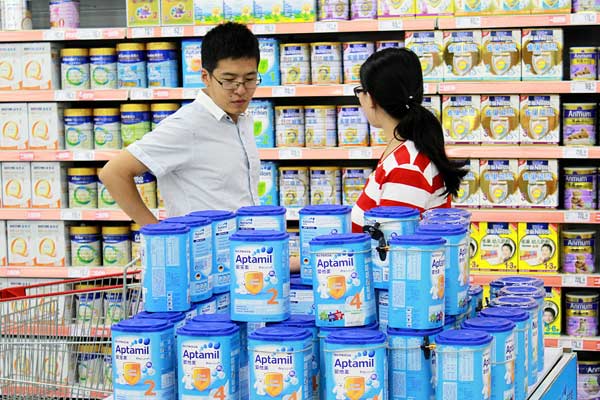From lab to farmland, technology revolutionizes agriculture in China
XI'AN — Zhang Pan used to think of agriculture as farmers wearing straw hats, carrying reaping hooks while laboring on the land despite strong winds or scorching heat.
However, when he was accepted into a graduate program two years ago he realized that the natural environment can be controlled to prevent plants from harmful weather and improve productivity.
In the lab at Northwest Agriculture and Forestry University, where Zhang studies, a piece of equipment emits a purple light onto several lettuce plants sitting in water. The temperature, humidity and light intensity are monitored by a control terminal.
Zhang and three other students from the university jointly developed the technology. "The equipment can control the root temperature of the crops and supplement sunlight at any time based on their needs," he said. "It is one of the techniques of protected cultivation."
Protected cultivation involves a series of techniques modifying the natural environment of plants to improve their quality and yield.
Tests showed that the yield, levels of Vitamin C and amino acids in eggplants grown with help of Zhang's equipment saw an increase of 30 percent, 20 percent and 30 percent respectively, compared with those grown in open fields.
With the world's population projected to reach 9 billion by 2050, experts expect food resources will need to increase by 60 percent. In addition, extreme weather events are on the rise, creating additional obstacles to productivity.
"With protected cultivation, we can shield crops from extreme temperature, wind, rain, hail and snow, creating a microclimate that improves their productivity and quality, and allowing better use of land resources," said Zhang.
Developing protected cultivation is among the agricultural technology the government has been working on to help rural residents in the arid and semi-arid regions.
Yangling in Northwest China's Shaanxi province, where Zhang's university is located, has had a hi-tech agricultural industrial demonstration zone since 1997.
Covering an area of 135 square kilometers, the zone has more than 7,000 researchers. Much of China's agricultural technology, crop varieties and agricultural management modes have been developed there.
According to Liu Tianxiong, deputy director with the administrative committee of Yangling Demonstration Zone, Yangling has set up 302 demonstration bases across 18 provincial-level regions during the past 20 years, bringing more than 1,000 new crop varieties and agricultural technologies to farmers' fields.
Chinese companies are also using technology to revolutionize traditional agriculture.
At the China Yangling Agricultural Hi-Tech Fair held in early November, Chinese drone manufacturer DJI-Innovations presented its MG-1S drone which is water-resistent and can spray pesticides and liquid chemical fertilizers.
"Drones can help farmers improve the efficiency of spraying, save costs, and increase the use ratio of chemicals, which is more environmental-friendly," said Chen Jinqiuye, an agent for DJI.
A Shanghai mechanical and electrical company has invented a field mower, which stands 60 centimeters tall and is able to operate on hillsides and in forests.
According to An Zhihui, the company's general manager, the machine is controlled remotely. It can mow 0.3 hectares of grass in an hour, equivalent to ten workers.
A Beijing company has invented soil testing equipment which ascertains the nutritional makeup of soil and provides a scientific fertilization program, from just a small soil sample.
Based on market research, Zhang and his classmates found that their invention can be used in balcony gardening, flower and herb planting, however, consumers thought it was too expensive.
"It depends on how much equipment needs to be installed in the greenhouse. Basically it costs 450,000 yuan ($68,000) per hectare," Zhang said. "We are trying to lower the cost."
He imagines a future farming landscape with many automated machines shuttling back and forth on the land, while farmers drink tea in the shade of a tree, using smart phones or tablets to control the machines.
"Agricultural technology must leave the labs to serve the farmers in the farmlands, pastures and orchards," he said.
- Qiandeng stands out at 2017 cross-Straits agriculture products fair
- Accelerating the Integration of Industrial Chain and Promoting the Competitiveness of China’s Agriculture
- Brand agriculture: a new model for Jilin
- Leisure farming projects built to promote ecological agriculture in Fujian
- Intl agriculture conference held in Beijing

























